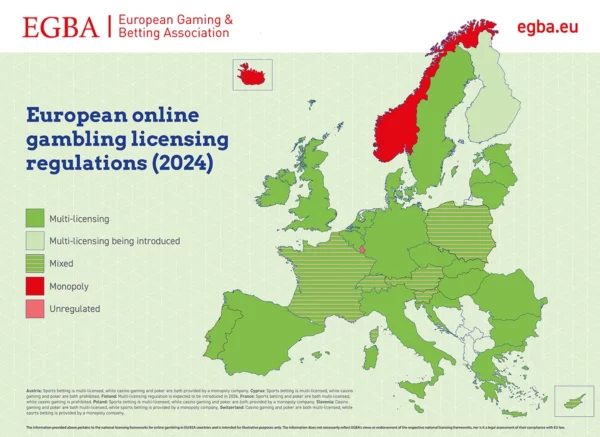Online Gambling in Europe: Multi-licenses conquer the market!
The European online gambling market has changed significantly in the last few years. People are increasingly choosing multi-license systems even though many nations once controlled the online gambling industry. According to a recent study by the European Gaming and Betting Association EGBA a multi-license system is in use in no fewer than 27 of the 31 European countries.
What is a Multi-license system?
A multi-licensing system allows a number of companies in a country to adhere to strict regulations to operate their online gambling services. The old model had only one monopoly, often from the government.

Key findings from the study:
- 27 of the 31 European countries have some form of multi-licensing system. This shows a clear preference for open and competitive markets.
- Four countries do not yet have a form of multi-license system: Finland, Iceland and Norway excluding state monopoly and Luxembourg no specific online gambling rules.
- Of the 27 countries with multi-licenses, 23 have a complete system for all online gambling products.
- Four countries have a mixed system: Slovenia and Switzerland monopoly on online sports betting, Austria and Poland monopoly on online casino and poker.
- Cyprus casino and poker and France casino have product-specific bans, but do have multi-licenses for other online gambling products.
- Finland is undergoing legal reforms and expects to introduce a multi-licensing system in 2026.
- Multi-licensing systems: Benefits for Consumers, Governments and the Market
Multi-licensing systems: Benefits for Consumers, Governments and the Market
The move to a multi-license system for online gambling in Europe has many advantages. With better conditions, more transparent practices and a greater supply, the market is more competitive. Governments can regulate the market in a better way as a result of the increase in tax revenues. Multi-licensing systems improve market regulation and protect consumers against illegal activities.
Multi permit system in Belgium
The Belgian Gaming Commission (BKC), which has been monitoring compliance with the legislation since 1999, is responsible for the strictly regulated system of licensing for games of chance and casinos in the country. The multi-casino licensing system is essential for legal operation under strict conditions.
There are different types of permits: Class A for physical casinos, Class B for gaming arcades, Class C for gaming machines in catering establishments, Class E for suppliers of gaming cabinets and equipment. Each permit is location-specific, which prevents monopolies.
Cooperation between operators is allowed as long as they have the correct permits. To ensure fairness, financial transparency and player protection, operators must follow strict rules and are regularly audited by the Belgian Gaming Commission.


